“We need to grow as a society and understand the fragility of our minds” Lucy Sullivan discusses mental health crisises in Barking from Unbound
While we’ve seen many small press comics which have covered the subject of mental health, few have been as challenging and potent as Lucy Sullivan’s Barking. Her chronicling of a mental health crisis has been one of the most uncompromising and unflinching looks at the subject we have seen. We caught up with Lucy just after Thought Bubble 2019 to find more more about it’s meaning, her relationship with publishers Unbound, as well as her unique art style.
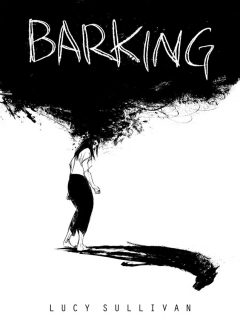
Your new book Barking is about a mental health crisis, it feels like a very personal story, is it based on your own experiences or those of friends or a mix of the both?
LS: It’s a combination. I had a mental health crisis in my 20s after my dad died suddenly. It wasn’t clear that was what was happening to me at the time & it took a catastrophic night out for it to become clear and I got help.
When I subsequently saw friends go through a similar ordeal, but they were also sectioned, it threw a sharp light on the persisting stigma around our minds and how we, as a society treat someone in that vulnerable, terrifying state.
I was lucky to not be sectioned back then but when I started developing Barking I knew I needed to talk about that too so I combined a number of experiences with research to create an allegory around Alix, a fictional character that goes through what I think I would’ve experienced had I been sectioned at that volatile moment.
It feels like a very brave step to put such personal material into a book, are you hoping it will help those going through similar experiences or is it part of a cathartic process for yourself?
LS: I’m very much hoping it will help others. Depression & other forms of mental illness tell you that you are alone, you are different and no-one could possibly understand. It’s a lie. So many people experience mental health issues and suffering alone is the worst part, along with the shame & self loathing. We need to grow as a society and understand the fragility of our minds and that when they fail us there is nothing to be embarrassed by.
It was probably the opposite of catharsis to create Barking. I’ve been very honest about what I experienced then and now. There’s still a lot of misunderstanding of what depression feels like and a huge taboo around grief. I needed to tell this story in order to feel like I was contributing to actively changing that.
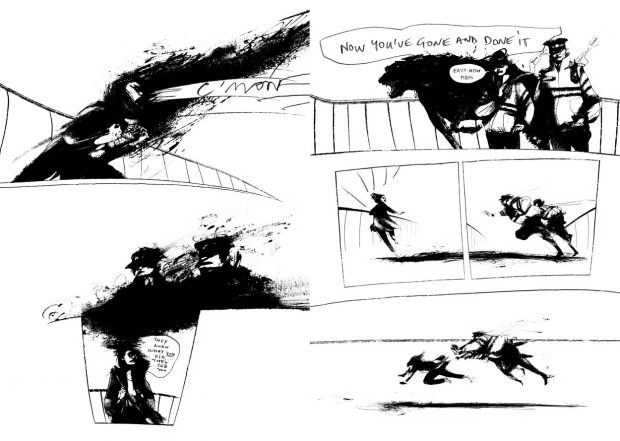
It’s quite an uncomfortable and challenging read in places. Was it important for you to create a book which challenged and provoked the reader, rather than make it simply a passive reading experience?
LS: The most important aspect was being honest and true to my research. I didn’t intend for it to be challenging but I guess that’s the nature of the topic. I did want it to feel frightening in places as that is true to the experience. I drew a lot of reference from film & tv influences such as American Werewolf in London, Dark Water and Poppy Shakespeare TV drama. There’s also a fair amount of mythology and psychological theory in the mix. I hope that will make it more entertaining too but definitely in a darker way. Mostly I hope that the reader will empathise with Alix and go with her through the process and gain some enlightenment into how it feels to be in a crisis. The only real way to break the stigma is to talk openly about these topics.
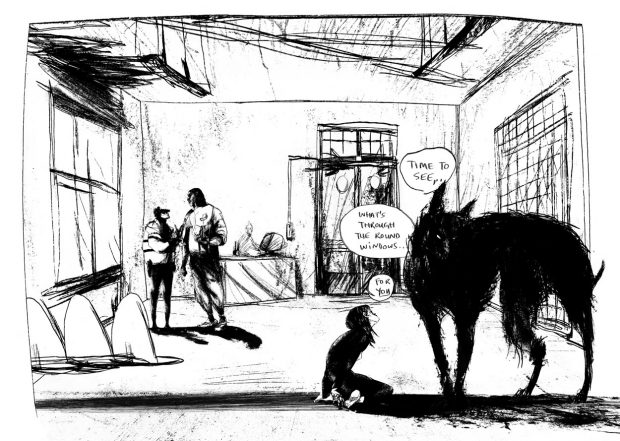
You have a very unique art technique, can you tell us a bit about the process?
LS: I came to comics from Hand-drawn Animation and a career teaching observational drawing. Both are definitely present in my artwork. I spent years developing the style of the book, working on it around my other jobs. I knew it had to feel both urgent and visceral so I drew the whole book with a biro or on carbon typewriter sheets. The materials themselves are messy & unruly but produce beautiful lines so felt very apt to the subject. I drew it all the main story in a sketch like fashion to a loose thumbnail plotting then scanned it and used Photoshop for the layouts. The establishing environment shots were drawn with carbon on site around the South Bank of London. It’s a very long way round making comics and definitely worth it for this book but not one I repeat very soon!
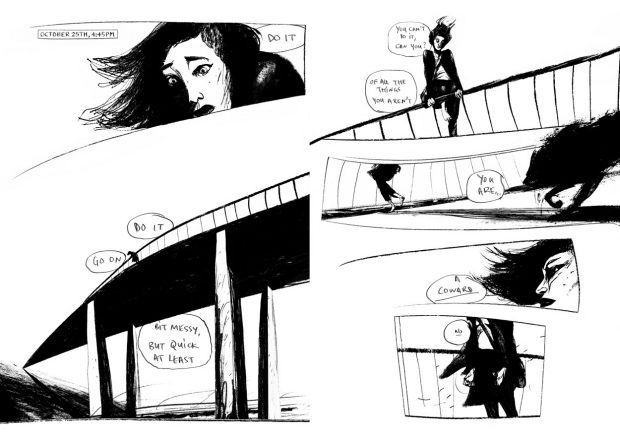
Mental health seems to be covered a lot in small press comics, to great effect, why do you think comics is such a potent medium for these kinds of stories?
LS: I think it’s the unique connection you can have with a reader that makes it such a powerful medium. Comics are such an intimate form, where you can not only describe your thoughts to a reader but let them step right into your vision. The fact that they can be used to portray any genre of storytelling is why it’s the highest literary form for me. We just need the non-comics world to catch on to that.
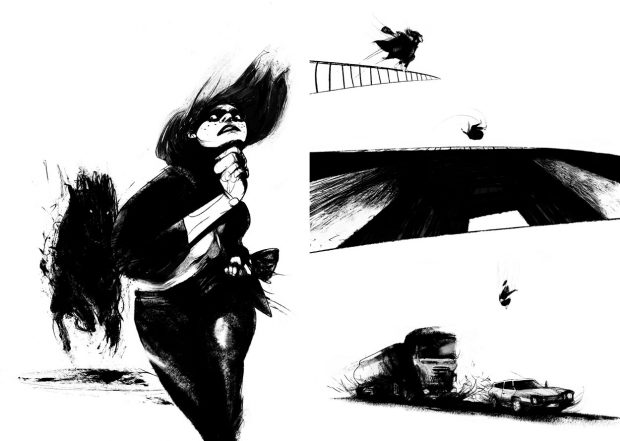
You are releasing the book through Unbound, can you tell us a bit about how that relationship came about and what the advantages you have found from using them?
LS: It was one of those serendipitous moments you couldn’t make up. My good friend Nick Abadzis (Laika) was over here & having lunch at our house. I’d shown him the pitch book I’d created of the first few chapters & he wanted to help. So he got me into a comics event where I met lots of people including Lizzie Kaye (Graphic Novels Commissioning editor at Unbound) Nick had explained Barking and Lizzie asked to see it. I very nearly talked her out of it. I thought she was just being nice but she read it and said she’d be interested.
It was an easy choice to make, Unbound has a strong literary presence & that would mean a wider audience for the book. It was important for me to reach as many people as possible & I was just starting out. Added to that was Lizzie’s experience and complete empathy for the project that made it the perfect fit. It is a tough process though. Barking took 18 months to fund with over 280 backers. That includes gaining Arts Council England funding & support from the Lakes International Comic Art Festival. I spent 2 years posting on social media, emailing and doing presentations but I’m thrilled that the book will be printed soon in Hardback and crowdfunding has helped me start a career in comics. It was uncomfortable putting yourself out there at times but the response has been very positive. Comics people are a very supportive and encouraging lot!
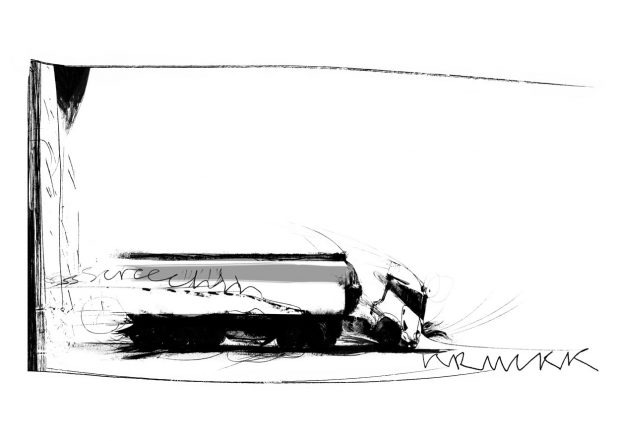
And finally if you could offer any advice to anyone going through a mental health crisis, or who knows someone who is going through one, what would that be?
LS: Tell someone. Anyone you can feel able to do so. Saying it out loud is the first step and the most powerful. No one can tell what you’re going through so tell someone. You never know who might be able to help. There lare lots of excellent, free services and call centres that will happily talk and point you in the right direction for help such as Mind, The Samaritans or Rethink Mental Illness.
You can support Barking via Unbound here and you can see more of Lucy’s work at lucysullivanuk.com



October 8, 2025 @ 11:20 pm
Your writing style is engaging. Stream wontumi online tv sports today live — live talk shows and events. HD streaming with low latency. studio discussions, news bulletins, program schedule. Including today’s schedule. simple interface and quick start.
December 19, 2025 @ 9:01 pm
Zu meinen persönlichen Favoriten gehören Bücherslots
wie Book of Ra und Eye of Horus. Ein seriöses Online Casino
erkennt man aber auch daran, das es Präventionsmaßnahmen gegen Spielsucht aufzeigt, denn jeder seriöse Anbieter sollte
seine Kunden dazu anhalten, verantwortungsvoll zu spielen. Werden zudem Online Automatenspiele von verschiedenen Softwareentwicklern angeboten, wirkt sich dies ebenfalls positiv aus.
Eine feste Anzahl an Freispielen auf ein bestimmtes Spiel oder auf alle
Casino Slots erhält. Hier auf slot-spiele.de empfehlen wir nur Slot Casinos
mit hohem und dennoch fairem Casino Bonus.
Einige Internet Casinos offerieren auch ein kleines Startguthaben oder
ein paar Casino Freispiele ohne Einzahlung.
Gemeinsam als Team haben wir in den letzten zehn Jahren Hunderte verschiedener Slots gespielt.
Die schiere Vielfalt an Online-Free-Slots scheint oft endlos zu sein. Dank der einzigartigen kaskadierenden Walzen von Skywind und
niedlichen Grafiken ist dieser Fünf-Walzen-Slot das perfekte Handyspiel.
Dieses Betsoft-Spiel bietet elegante Grafiken und lebendige Visuals, die etwas frischen Wind in das überarbeitete ägyptische Slot-Thema bringen. Wir haben die meistgespielten Spielautomaten auf unserer Website unten mit
den wesentlichen Informationen für jedes Spiel zusammengestellt.
Teilweise sogar durch die GGL, die damit beauftragt ist die Regulierung von online Casinos in Deutschland
zu übernehmen.
References:
https://online-spielhallen.de/verde-casino-bonus-code-ihre-umfassende-anleitung-zu-den-besten-angeboten/
December 26, 2025 @ 12:37 pm
This means you must stake the bonus amount a specific number of times before withdrawal.
WinSpirit’s live casino brings authentic table action to your
screen with professional dealers and high-quality streams.
Whether you open the WinSpirit casino app or spin from desktop, understanding mechanics improves enjoyment and bankroll control.
WinSpirit lists RTPs for many games — common ranges
are 95%–98% for mainstream slots.
If you see unfamiliar variants like winsprit or win-spirit in search results, verify URLs carefully before submitting account data.
Players who wish to verify can look for certificates within the
game’s provider page or request audit summaries from support.
Bingo at WinSpirit blends classic cards with slot-style bonuses.
This balance helps you decide if Win Spirit
online casino fits your gaming needs. The support
team is also there to help, ensuring your Win Spirit casino sessions stay fun. With smooth streaming and easy access,
it’s a great way to experience casino action in real time.
It’s perfect for players in Australia looking for excitement
without leaving their couch. With a range of payment options like credit cards, e-wallets, and crypto, Australian players can choose what suits them best.
References:
https://blackcoin.co/stay-casino-no-deposit-bonus-australia-free-spins-bonus-codes-2025/
December 27, 2025 @ 10:49 am
LevelUp Casino is fully optimized for mobile devices, allowing
you to enjoy your favourite games anytime, anywhere. The minimum deposit amount
is generally AU$10, making it accessible for a
wide range of players. You can chat with the dealer and other players,
watch every move, and feel just like you’re sitting at a real gaming table.
For those who prefer a more intellectual and strategic approach to gaming,
Level Up Casino offers a superb selection of table
games. LevelUp Casino rolls out the red carpet for new Australian players with a fantastic
Welcome Package spread across your first four deposits,
offering up to AU$8000 + 200 Free Spins.
Register today, claim your bonus, and level up
your gaming experience — where every spin brings you closer to a
win! It delivers push notifications, optimized performance, and instant access
to the casino — perfect for gaming on the go. The platform
uses SSL encryption to protect personal data and payments, providing a completely secure gaming environment.
LevelUp Casino is a fully licensed online casino, operating under
international gaming regulations to ensure fairness and transparency.
Players can access the full range of games and features without needing to download additional software.
Level Up Casino is fully compatible with mobile devices, offering a seamless experience through its mobile-friendly website.
The minimum deposit is $10, and withdrawals are
typically processed within hours. The platform employs advanced security measures, including 256-bit SSL
encryption, to protect sensitive data. Level Up Casino operates under a license issued by the
government of Curaçao, ensuring a safe and regulated environment for its players.
References:
https://blackcoin.co/monte-casino-overview/
December 29, 2025 @ 5:48 am
paypal casino android
References:
http://www.ptshop.co.kr
December 29, 2025 @ 6:12 am
online real casino paypal
References:
http://www.chinajobbox.com/companies/best-paypal-casinos-usa-%e1%90%88-top-real-money-paypal-casinos/
January 26, 2026 @ 6:48 pm
**mitolyn reviews**
Mitolyn is a carefully developed, plant-based formula created to help support metabolic efficiency and encourage healthy, lasting weight management.
February 6, 2026 @ 11:18 pm
air conditioning and heating companies [url=https://otvetnow.ru]https://otvetnow.ru[/url] probate attorney san francisco
February 8, 2026 @ 7:42 pm
https://askoff.ru
February 12, 2026 @ 3:24 pm
https://hrjcdfdcvj.wordpress.com